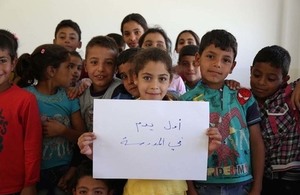UK backing Lebanon's community resilience
The visit to Terbol school and municipality was to show the UK support to host communities in face of the Syrian crisis

Syrian children in a Lebansese school in the Bekaa
British Ambassador Designate to Lebanon Hugo Shorter visited the Bekaa today with Minister of Education Elias Bou Saab, representative of the Ministry of Social Affairs Suheir El Ghali, and UNDP Country Director Luca Renda, to inspect the public school of Terbol. Shorter also met with the representatives of the municipality of Terbol and discussed how the UK is supporting Lebanese host communities to deal with the impacts of the Syria crisis. During the visit Shorter and Bou Saab sought to draw attention to the deadline for second shift enrolment which is ending soon.
Thanks to UKAid, the reopened school with the appropriate health and safety standards, will now serve Lebanese and Syrian students in the area. The UK’s support along with that of UNDP, the Ministry of Education and the Ministry of Social Affairs, recognises the importance of ensuring that all vulnerable Lebanese and Syrian refugee children living in Lebanon can access a quality education. Four years of fighting has forced half a million school-age children to flee from Syria to Lebanon. More than half of them do not have access to a decent education. Britain remains firmly committed to helping this traumatised generation of refugees to continue their education despite the crisis.
The UK has also helped the municipality of Terbol with the installing of street lighting and solar pump for water which will improve livelihoods in the region. This is one of many UK projects funded by the Department for International Development (DFID). The project aims to deliver improved municipal and basic services in the most affected municipalities such as medical equipment and supplies for schools and healthcare centres, water and waste management rehabilitation and maintenance of public wells and more.
Speaking at the end of the visit, Ambassador Shorter said:
‘The Lebanese people are showing, on a daily basis, their resilience, tolerance and generosity in the face of incredibly challenging circumstances, when at least a quarter of the country’s population consists of refugees. My visit to the Bekaa valley underlined to me the importance of strong, multi-year commitments by the international community to support Lebanon’s stability and development. We want to see that every child receives a proper education and municipalities are able to develop the basic infrastructure and services needed to meet growing needs. After Prime Minister Cameron’s announcement of an additional £20m during his visit in September, the UK has now committed a total of £80m over five years to support Lebanon’s severely overstretched public school system, and give children – Lebanese and Syrian - the chance of a better future. We are by Lebanon’s side and are committed to furthering our support in the coming years.
UNDP’s Renda said:
I think Lebanon is setting an example for the world, for compassion, for humanity, for solidarity, but Lebanon cannot do this alone the international community has a duty to support Lebanon in managing this situation. The UK, the Ministry of Social Affairs and UNDP in the last two years have invested more than USD 21 million in projects that are benefitting the Lebanese communities.
Notes to editors:
- The UK’s Department for International Development (DFID) in partnership with MOSA and UNDP roughly doubled the support to host communities in 2015/16 to £9 million (over $13.5m), enabling us to partner with 49 of the most vulnerable municipalities, which we see as on the front line of the response. In doing so we are working closely with the mayors and members of the community.
- The UK has pledged over £304 million (over $465m) of support for refugees and host communities in Lebanon, in addition to our contributions through the EU and UN.